All families deserve to reach their full potential but many face challenges and inequities that prevent their growth. Ascend at the Aspen Institute’s Family Prosperity Innovation Community tackles big, complicated problems in order to address societal gaps in responsibility so that we can cultivate a stronger, collective national mindset for improving the lives of families and communities.
Family Prosperity builds bold policies and practices that put child and family outcomes at the center. Each of the 20 Partners focuses on developing innovations and recommendations to solve one or more of the biggest threats to family prosperity. Partners develop innovations and recommendations around paid leave and child care, equitable strategies to support families’ health, employment partnerships, and public health programs like SNAP in order to disseminate a portfolio of actionable strategies for policymakers, practitioners, and employers to implement and share. The policies and practices within these publications are tools for leaders to transform the way workers with low wages are supported and to improve opportunities for families to thrive. Paid family and medical leave, workplace accommodations for pregnant employees, and accessible child care are just a few of the policies that are critical components of advancing prosperity from one generation to the next.
Cash Payments
Direct, no-strings-attached cash payments are not just popular, but they have proven to be effective at curtailing poverty. Families living in or near poverty spend close to 100 percent of their income just to meet basic needs. Guaranteed income or universal basic income (UBI) programs can stabilize a family’s finances by meeting immediate needs, like putting food on the table, and they can help families invest in their futures and achieve their dreams.

Podcast Episode: Cash Matters
January 2020 (Phase I)
Dr. Aisha Nyandoro, CEO of Springboard to Opportunities, and Ebony Beals, business owner and Springboard to Opportunities’ participant, sat down to talk about how cash shared with mothers with low incomes — with no strings attached — can have an outsize effect on their lives, and the lives of their children, families, and communities.
Child Care
Before the pandemic, family child care or home-based child care was in sharp decline: in just three years between 2014–2017, 22% of regulated family child care programs closed or left the regulated child care system. Now, nearly one half of the child-care supply in this country – some 4.5 million slots – could close permanently due to COVID-19. Government, businesses and communities have a shared role in providing child care access to families.
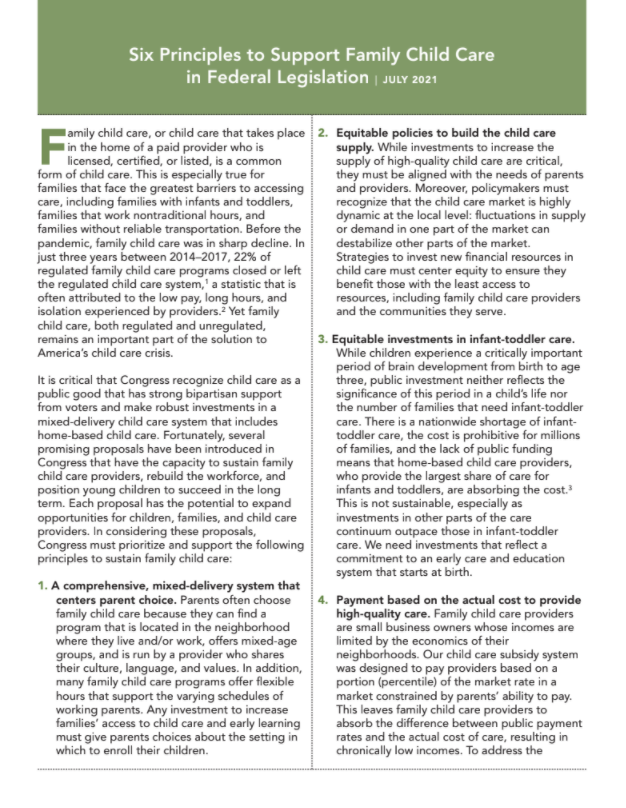

Principles to Support Family Child Care in Federal Legislation
July 2021
All Our Kin released six principles that should be included in any federal child care legislation to sustain family child care providers, rebuild the workforce, and position young children to succeed in the long term.
Paid Family and Medical Leave
Only 21% of workers in the U.S. have access to paid leave through their employer, and individuals of colors are even less likely to have access, which exacerbates racial disparities and leads to devastating health and financial outcomes.
Support for paid family and medical leave is growing and has increased in urgency, putting pressure on policymakers and business leaders to prioritize this as a benefit. However, a familiar conflict has carried through into the COVID-19 era: the question of how to fund programs, and who should carry the responsibility for these policies and programs.
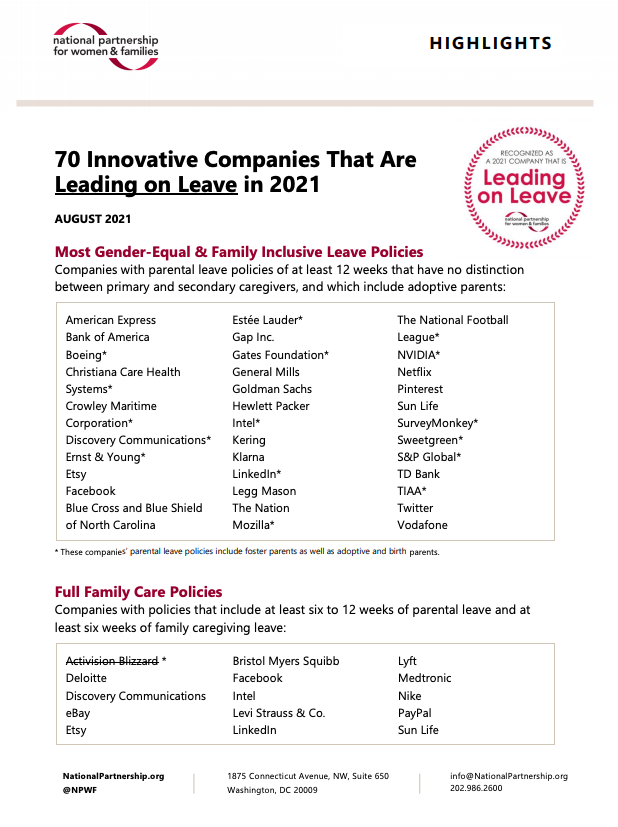

70 Innovative Companies that are Leading On Leave
National Partnership for Women and Families
July 2021
National Partnership for Women & Families published a report that recognizes business that offer a range of paid family and medical leave programs. This report was released as an update to their “Leading on Leave: Companies with New or Expanded Paid Leave Policies” report originally published in August of 2020. The initial report detailed the progression of paid leave policies in almost 200 diverse businesses from 2015 to 2020. This most recent addendum to the report features Etsy, American Express, and Mozilla among others as having the most gender-equal & family inclusive leave policies. The report also details employers leading the way in full family care policies, comprehensive leave for parents who give birth, and part-time employment equity.
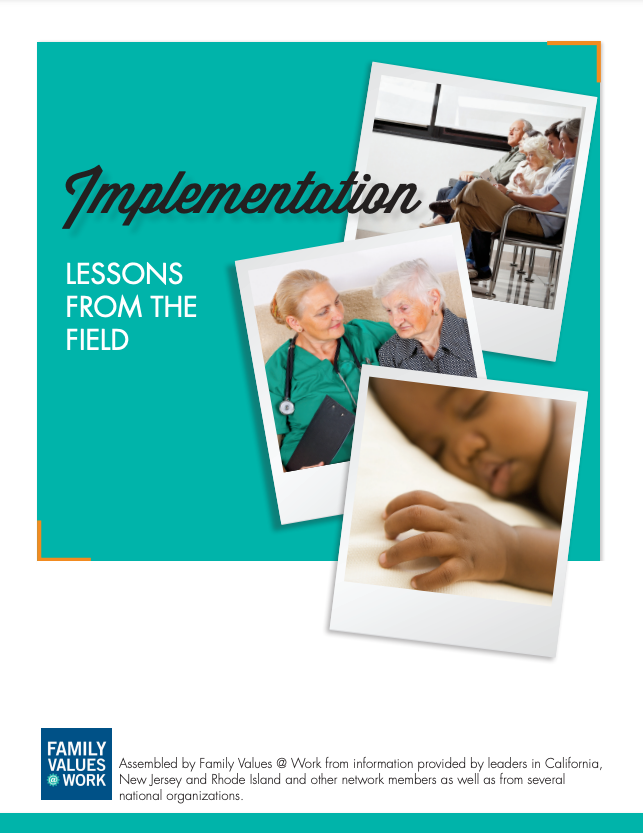

Implementation Lessons from the Field
December 2020
Family Values @ Work developed this tool to compile best practices to provide employers and trusted messengers with the outreach and education needed for implementation of paid leave programs.
Health & Well-Being
Poverty is associated with lifelong poor health, and financial instability, such as a lack of emergency savings and a dependence on gig work, affects half of Americans and is associated with poor health outcomes.
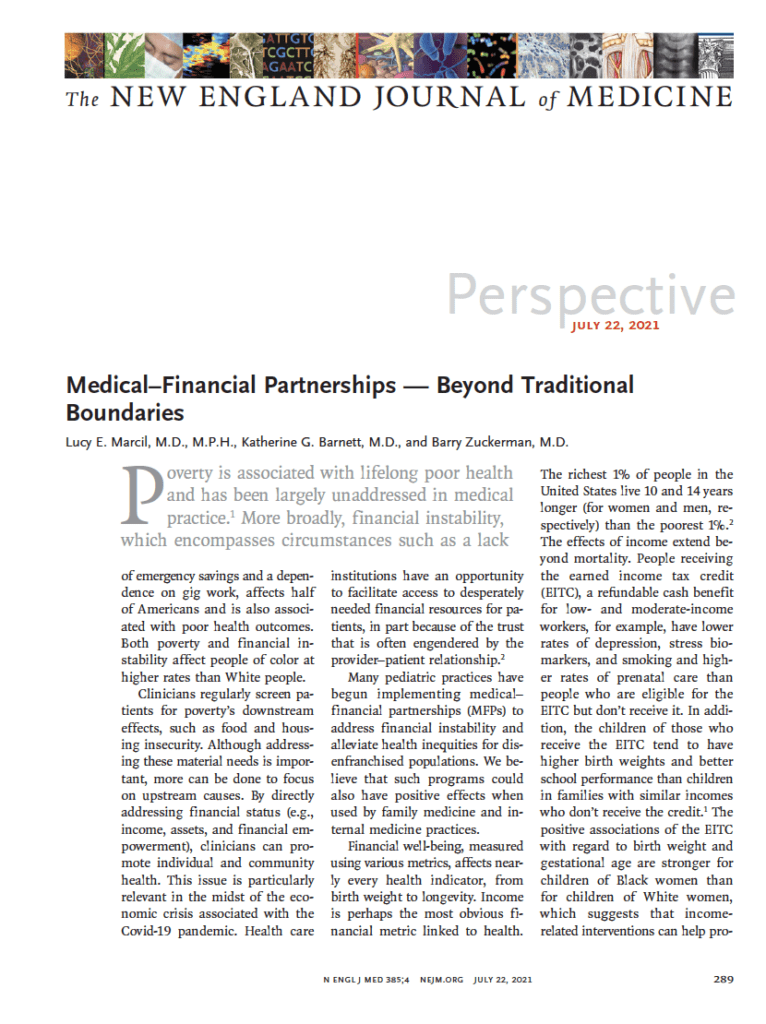

New England Journal of Medicine: Medical–Financial Partnerships — Beyond Traditional Boundaries
Streetcred (Lucy E. Marcil, M.D.)
July 2021
Dr. Lucy Marcil, Executive Director of Streetcred, was published in the New England Journal of Medicine explaining how clinicians can promote individual and community health by empowering their patients’ financial well-being.
Workforce Development
With our economy evolving and the nature of work and family changing, so is the definition of a “good job.” Simply being employed is not enough. A good job considers the whole person: health and caregiving priorities of employees and their families; wages that allow people to do more than just get by but get ahead; schedules that are predictable; and other issues that account for the realities of work and family. Institutional players like employers have opportunities to benefit both business and family by implementing meaningful policies and practices for working families by listening to their employees’ needs.
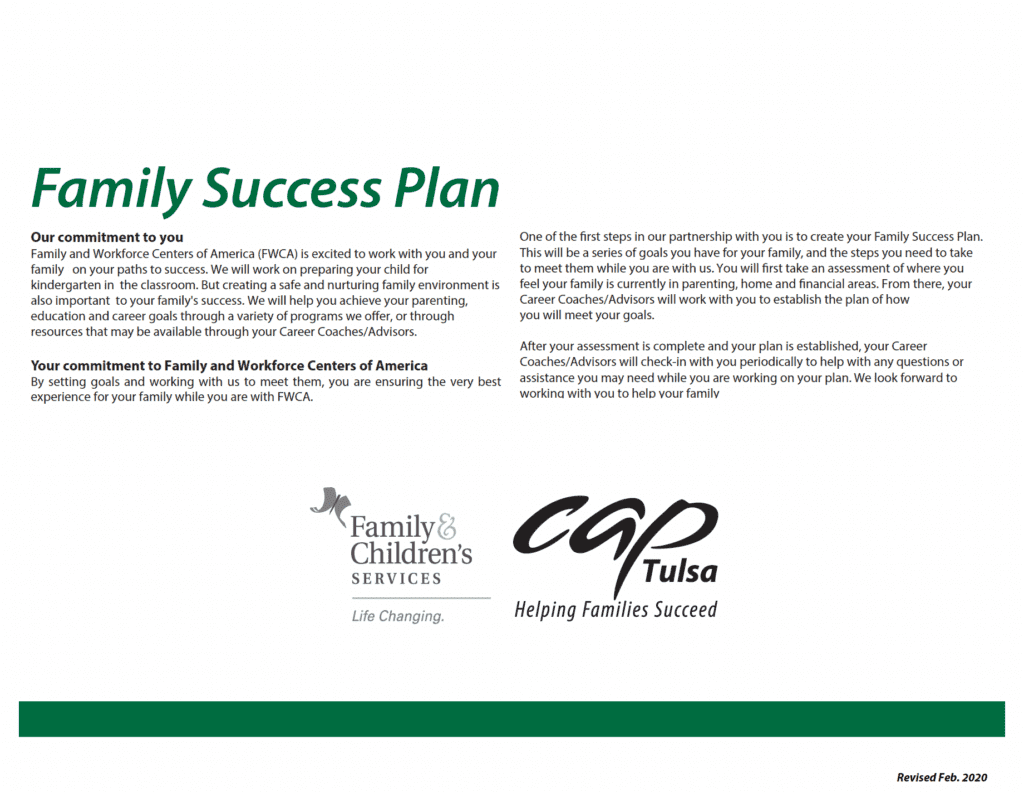

Family Success Plan
Family and Workforce Centers of America
August 2021
Parents are overwhelmed and worried by the disruptions caused by COVID-19. To parents and caregivers, “well-being” applies to financial, health, and emotional stability, but there are many barriers to economic and social mobility.
Family and Workforce Centers of America developed an assessment to improve partnerships with families so they can achieve parenting, education, and career goals.
Ascend Produced Assets And Resources
Phase II of Family Prosperity builds on previous lessons learned from Phase I to uncover overlooked pathways, implement new innovations, and continue to explore – and put to work – fresh thinking that dismantles deep-rooted discriminatory systems.
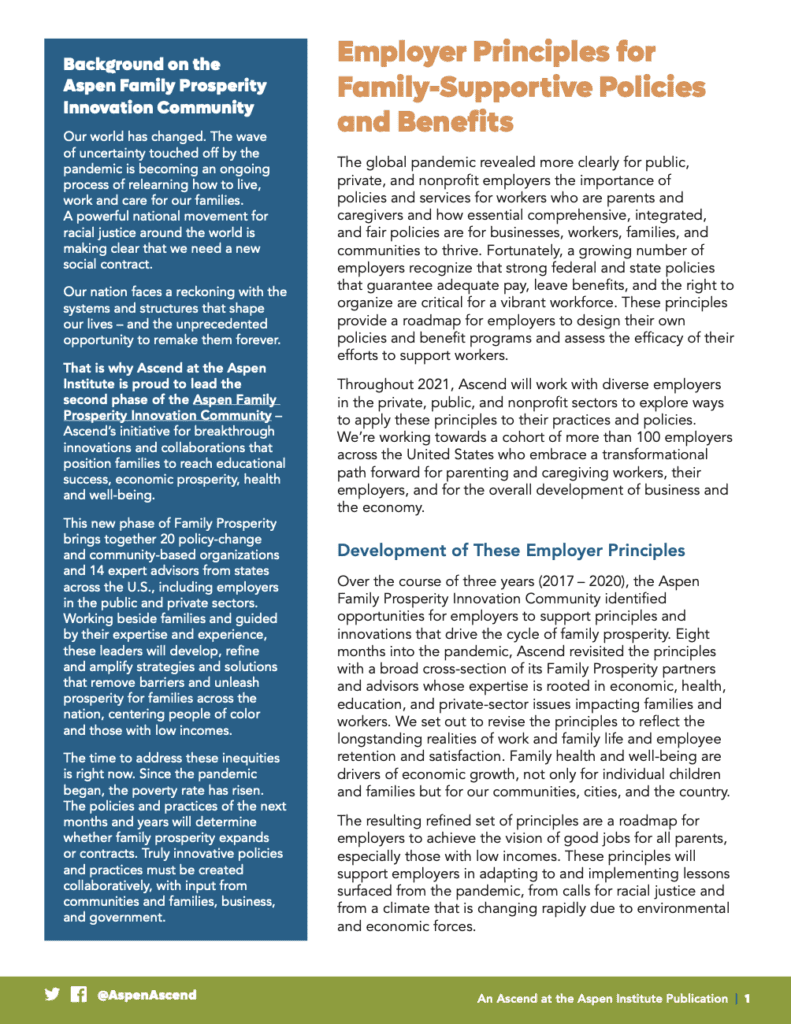

Four Employer Principles for Family Prosperity
Ascend at the Aspen Institute Family Prosperity Innovation Community
November 2021
The global pandemic revealed more clearly for public, private, and nonprofit employers the importance of policies and services for workers who are parents and caregivers and how essential comprehensive, integrated, and fair policies are for businesses, workers, families, and communities to thrive. Fortunately, a growing number of employers recognize that strong federal and state policies that guarantee adequate pay, leave benefits, and the right to organize are critical for a vibrant workforce. These principles, developed by Ascend at the Aspen Institute’s Family Prosperity Innovation Community, provide a roadmap for employers to design their own policies and benefit programs and assess the efficacy of their efforts to support workers.
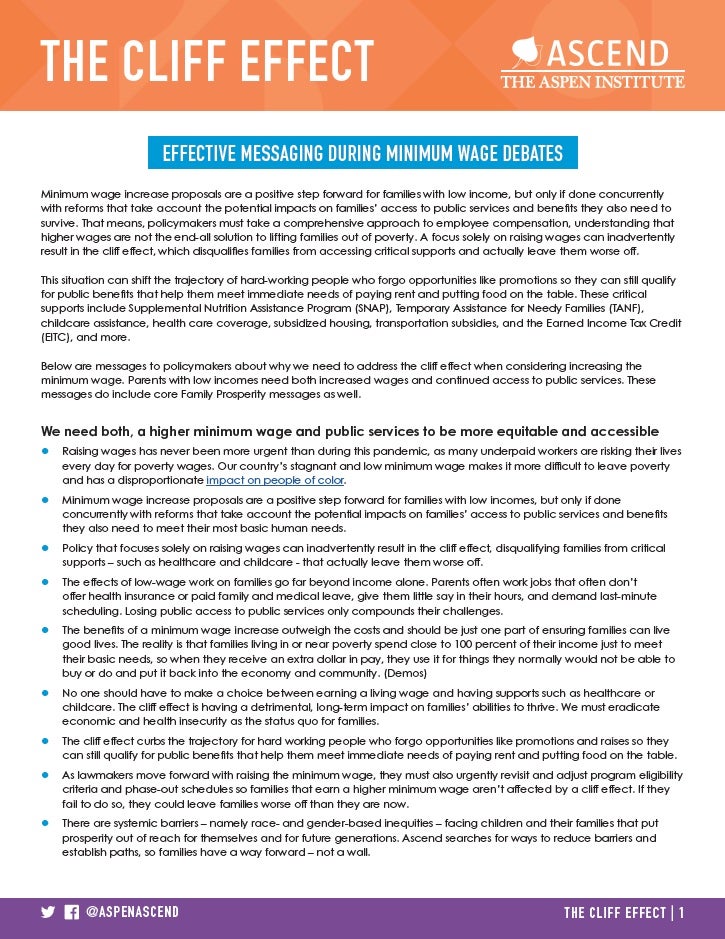

Cliff Effect Messaging Guide
Ascend at the Aspen Institute Family Prosperity Innovation Community
March 2021
Minimum wage increase proposals are a positive step forward for families with low income, but only if done concurrently with reforms that take account of the potential impacts on families’ access to public services and benefits they also need to survive. A focus solely on raising wages can inadvertently result in the cliff effect, which disqualifies families from accessing critical supports and actually leave them worse off. This document contains messages policymakers can use to address the cliff effect when considering increasing the minimum wage.
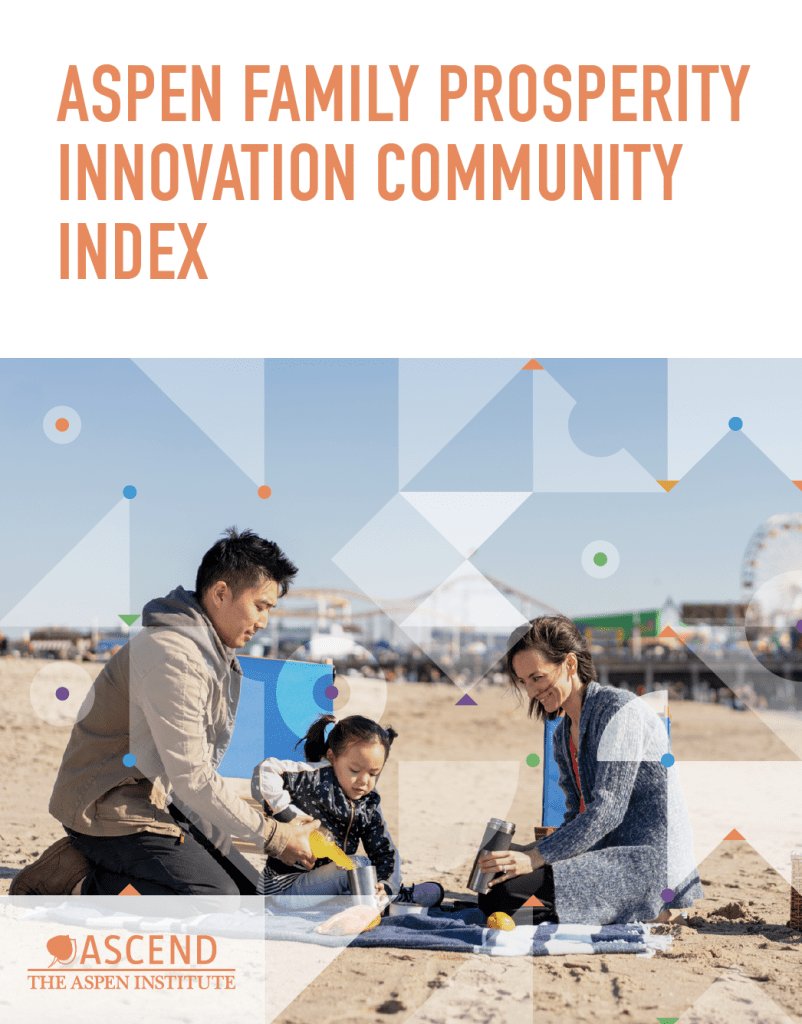

Family Prosperity Innovation Community Phase I Index
Ascend at the Aspen Institute Family Prosperity Innovation Community
October 2019
This is a collection of resources created by Phase I of the Aspen Family Prosperity Innovation Community partners with a wide range of research and resources to advance learning and action around what it takes to move families, especially those with low incomes, toward economic mobility.
